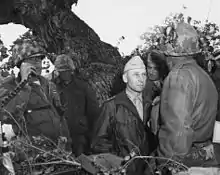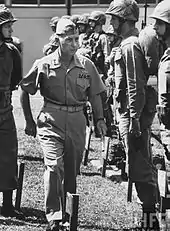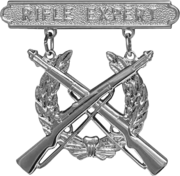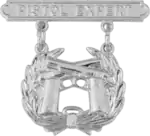Victor H. Krulak
Victor Harold Krulak (January 7, 1913 – December 29, 2008) was a decorated United States Marine Corps officer who saw action in World War II, Korea and Vietnam. Krulak, considered a visionary by fellow Marines,[3] was the author of First to Fight: An Inside View of the U.S. Marine Corps and the father of the 31st Commandant of the Marine Corps, Charles C. Krulak.
Victor Harold Krulak | |
|---|---|
 | |
| Nickname(s) | "Brute" |
| Born | January 7, 1913 Denver, Colorado |
| Died | December 29, 2008 (aged 95) San Diego, California |
| Buried | Fort Rosecrans National Cemetery, San Diego |
| Allegiance | United States of America |
| Service/ | |
| Years of service | 1934–1968 |
| Rank | |
| Service number | 0-4990 |
| Commands held | 2nd Parachute Battalion 5th Marine Regiment Marine Corps Recruit Depot San Diego Fleet Marine Force, Pacific |
| Battles/wars | World War II Vietnam War |
| Awards | Navy Cross Navy Distinguished Service Medal Legion of Merit (3) Bronze Star Medal (with "V") Purple Heart Air Medal |
| Spouse(s) | Amy Chandler (1936–2004; her death; 3 children)[1] |
| Relations | General Charles C. Krulak (son) |
| Other work | Newspaper columnist[2] |
Personal life
Krulak was born in Denver, Colorado, to Jewish parents, Bessie (Zall) and Morris Krulak. He later denied Jewish ancestry and claimed to have been raised Episcopalian.[4] He was married to Amy Chandler from 1936 until her death in 2004. The couple had three children.
Marine Corps career
Krulak was commissioned a U.S. Marine Corps second lieutenant upon graduation from the U.S. Naval Academy on May 31, 1934. His early Marine Corps service included: sea duty aboard USS Arizona, an assignment at the U.S. Naval Academy; duty with the 6th Marines in San Diego and the 4th Marines in China (1937–39); completion of the Junior School, Quantico, Virginia (1940); and an assignment with the 1st Marine Brigade, FMF, later the 1st Marine Division.
While stationed as an observer in Shanghai during the Second Sino-Japanese War in 1937, Krulak took photographs with a telephoto lens of a ramp-bowed landing boat that the Japanese had been using. Recognizing the potential use of such a craft by the U.S. armed forces, Krulak sent details and photographs back to Washington, but discovered years later that they had been filed away as having come from "some nut out in China". Krulak built a model of the Japanese boat design and discussed the retractable ramp approach with boat builder Andrew Higgins who incorporated elements of Krulak's input into the Landing Craft, Vehicle, Personnel (LCVP) or "Higgins boat", which played critical roles in the Normandy Landings and amphibious assaults in the Pacific.[5]
World War II
At the outbreak of World War II, Krulak was a captain serving as aide to General Holland M. Smith, the commanding general, Amphibious Corps, Atlantic Fleet. He volunteered for parachute training and on completion of training, he was ordered to the Pacific area as commander of the 2nd Parachute Battalion, 1st Marine Amphibious Corps. He went into action at Vella Lavella with the 2nd New Zealand Brigade.
As a lieutenant colonel in the fall of 1943, he earned the Navy Cross and the Purple Heart on Choiseul Island, where his battalion staged a week-long diversionary raid to cover the Bougainville invasion.[5] Later, he joined the newly formed 6th Marine Division and took part in the Okinawa campaign and the surrender of Japanese forces in the China area, earning the Legion of Merit with "V" device for valor and the Bronze Star.
The Navy Cross is presented to Victor H. Krulak, Lieutenant Colonel, U.S. Marine Corps, for extraordinary heroism as Commanding Officer of the Second Battalion, First Marine Parachute Regiment, during operations on Choiseul Island, Solomon Islands, October 28 to November 3, 1943. Assigned the task of diverting hostile attention from the movements of our main attack force en route to Empress Augusta Bay, Bougainville Island, Lieutenant Colonel Krulak landed at Choiseul and daringly directed the attack of his battalion against the Japanese, destroying hundreds of tons of supplies and burning camps and landing barges. Although wounded during the assault on October 30, he repeatedly refused to relinquish his command and with dauntless courage and tenacious devotion to duty, continued to lead his battalion against the numerically superior Japanese forces. His brilliant leadership and indomitable fighting spirit assured the success of this vital mission and were in keeping with the highest traditions of the United States Naval Service.
— Navy Cross citation[6]
The navy PT boat, PT-59, captained by John F. Kennedy helped evacuate Krulak's force from Choiseul at the end of the operation. In response, Krulak promised Kennedy a bottle of whiskey which he delivered almost 20 years later when Kennedy was serving as President of the United States.[7]
After the war, Krulak returned to the United States and served as assistant director of the Senior School at Marine Corps Base Quantico, and, later, as regimental commander of the 5th Marines at Camp Pendleton.
Korean War
He was serving as assistant chief of staff, G-3, Fleet Marine Force, Pacific, when the Korean War erupted, and subsequently served in Korea as chief of staff, 1st Marine Division, earning a second Legion of Merit with Combat "V" and Air Medal.
From 1951 to 1955, Krulak served at Headquarters Marine Corps as Secretary of the General Staff, then rejoined Fleet Marine Force, Pacific, as chief of staff.
1956 to 1959
In July 1956, he was promoted to brigadier general and designated assistant commander, 3rd Marine Division on Okinawa. From 1957 to 1959, he served as director, Marine Corps Educational Center, Quantico. He was promoted to major general in November 1959, and the following month assumed command of the Marine Corps Recruit Depot, San Diego.
Vietnam War

From 1962 to 1964, Krulak served as special assistant for counter insurgency activities, Organization of the Joint Chiefs of Staff; for which he was presented a third Legion of Merit for exceptional meritorious service by General Maxwell D. Taylor, Chairman of the Joint Chiefs of Staff. During this period, American military advisors were providing assistance to the South Vietnamese in their war against the Viet Cong. In September 1963, then Major General Krulak and Joseph Mendenhall, a senior Foreign Service officer, led a fact-finding mission to learn about the progress of the war. Krulak said that the situation was very good and supported President Ngo Dinh Diem, while Mendenhall claimed the opposite, leading Kennedy to famously ask the pair if they had visited the same country. In late December 1963, the new president, Lyndon B. Johnson, ordered an interdepartmental group to be headed by Krulak with the purpose of studying OPLAN 34A and selecting from it those targets the United States could hit in North Vietnam with the least amount of risk to its people. This was in keeping with the administration's policy of graduated pressure on the North Vietnamese.[8]

On March 1, 1964, Krulak was designated Commanding General, Fleet Marine Force, Pacific, and promoted to lieutenant general. For the next four years, Krulak was responsible for all Fleet Marine Force units in the Pacific, including some 54 trips to the Vietnam theater. Many sources including Coram (2010) report that the Chu Lai base, which commenced in May 1965, was named after Krulak's own Chinese name.[9]
At the beginning of the war, Krulak put forward the "Spreading Inkblot Theory." This promoted a spreading inkblot of small units actions to pacify South Vietnam village by village. When large enemy units were encountered then General Westmoreland's overwhelming firepower should be employed. He also called for intensive bombing of North Vietnam and mining of Haiphong Harbor. Krulak's plans were eventually rejected as Westmoreland favored hammering the enemy into submission through superior firepower and the Johnson administration feared relentless bombing of the North would provoke Soviet and Chinese intervention.[10] Krulak opposed the establishment of the Khe Sanh Combat Base.[11]
Krulak hoped to become the next Commandant of the Marine Corps, but in 1967 Lyndon B. Johnson selected Leonard F. Chapman, Jr.. As a result, Krulak retired on June 1, 1968, receiving a Navy Distinguished Service Medal for his performance during that period.[11] Military historian Robert Coram states that it was Krulak's comments to President Johnson criticizing the restraints placed on American military operations in Vietnam that resulted in Johnson's selection of Chapman over Krulak.[7] General Krulak's son Charles C. Krulak eventually became the 31st Commandant of the Marine Corps, serving from 1995 to 1999.
Medals and decorations
Krulak's medals and decorations include:
 | |||
 |
 | ||
| Badge | Navy/Marine Corps Parachutist Insignia | |||||||||||||||
|---|---|---|---|---|---|---|---|---|---|---|---|---|---|---|---|---|
| 1st row | Navy Cross | Navy Distinguished Service Medal | ||||||||||||||
| 2nd row | Legion of Merit w/ 2 award stars & valor device | Bronze Star with "V" device | Purple Heart | Air Medal | ||||||||||||
| 3rd row | Navy Presidential Unit Citation w/ 3 service stars | China Service Medal w/ 1 service star | American Defense Service Medal w/ Base clasp | American Campaign Medal | ||||||||||||
| 4th row | Asiatic-Pacific Campaign Medal w/ 3 service stars | World War II Victory Medal | Navy Occupation Service Medal | National Defense Service Medal w/ 1 service star | ||||||||||||
| 5th row | Korean Service Medal w/ 4 service stars | Vietnam Service Medal w/ service star | Order of Service Merit, Second Class | National Order of Vietnam, Commander | ||||||||||||
| 6th row | Vietnam Gallantry Cross w/ palm | Korean Presidential Unit Citation | United Nations Korea Medal | Vietnam Campaign Medal | ||||||||||||
| Badge | Rifle Expert Marksmanship Badge | Pistol Expert Marksmanship Badge | ||||||||||||||
Strategic vehicle advocacy
Krulak was an early advocate of using helicopters as attack platforms. He was also instrumental in the development of Higgins boats, which enabled beach landings of men and material in World War II.[12]
Post-military career
After retiring from the Marine Corps, Krulak worked for Copley Newspapers, including serving as president of Copley News Service and vice president of Copley Press. He retired from Copley in 1977, though he continued to contribute to their news service.[13] Krulak also wrote a number of books, including the iconic Marine Corps history First to Fight.[14]
Krulak was a personal friend of Ronald Reagan. They wrote each other regularly.[15]
In retirement, Krulak was active in community organizations, as well as participating in Marine Corps activities. He served as president and trustee of the Zoological Society of San Diego.[16] His wife, Amy, died in 2004.[11]
On December 29, 2008, Lieutenant General Krulak died at age 95 in San Diego, California.[14][17] He was survived by his three sons – retired Marine Corps Commandant General Charles Krulak, Reverend Victor Krulak (Commander Navy Chaplain Corps), Reverend William Krulak (Colonel USMCR) – four grandchildren, and 10 great-grandchildren.[16] Krulak's funeral was held on January 8, 2009, in the chapel at MCAS Miramar, with burial at Fort Rosecrans National Cemetery.[16]
Honors
In 2004, Lieutenant General Krulak was the recipient of the U.S. Naval Academy's Distinguished Graduate award, which honors alumni who have "provided a lifetime of service to the nation or armed forces, have made significant and distinguished contributions to the nation via their public service and have demonstrated a strong interest in supporting the Navy or Marine Corps and the United States Naval Academy. These individuals are the embodiment of the Naval Academy's mission to provide graduates who will be ready '…to assume the highest responsibilities of command, citizenship and government.'"[18]
In 2007, at the Marine Corps Association's first annual banquet, Secretary of Defense Robert Gates recounted the story of Krulak's time in China and his career:[19]
Krulak's was, of course, a legendary career: Navy Cross; counterinsurgency advisor to the Joint Staff; commander of the Fleet Marines in the Pacific during the Vietnam War; and, father of a future Marine Commandant, Chuck Krulak.... Victor Krulak's story and accomplishments teach us a good deal:
- About learning from the experiences and setbacks of the past;
- About being open to take ideas and inspiration from wherever they come; and
- About overcoming conventional wisdom and bureaucratic obstacles thrown in one's path.
His book First to Fight won the 1984 Samuel Eliot Morison Award for Naval Literature.[20][21]
The Brute Krulak Center for Innovation and Creativity (BKCIC) at the Marine Corps University is named after Victor Krulak.
Published works
- First to Fight: View of the U.S. Marines. Simon & Schuster. 1991. ISBN 0-671-73012-6.
- Panama: An Assessment. U.S. Strategic Institute. 1990. ISBN 0-913187-03-8.
- Organization for National Security: A Study. U.S. Strategic Institute. 1983. ISBN 0-913187-00-3.
See also
References
- http://www.encyclopedia.com/article-1G2-3436600324/krulak-victor-harold.html
- "Letter from Victor H. Krulak to Mr. Fletcher Prouty, March 15, 1985".
- "Prominent Marines". Marine Corps Legacy Museum. Archived from the original on July 10, 2006. Retrieved July 11, 2006.
- Garner, Dwight (November 9, 2010). "Robert Coram's 'Brute' Recalls Gen. Victor Krulak – Review". The New York Times.
- Goldstein, Richard. "Victor H. Krulak, Marine Behind U.S. Landing Craft, Dies at 95 ", The New York Times, January 4, 2009. Retrieved January 5, 2009.
- "Navy Cross Awards to members of the U.S. Marines in World War II". HomeOfHeroes.com. Archived from the original on August 29, 2006. Retrieved July 11, 2006.
- Liewer, Steve, "'Brute' Krulak Commemorated", San Diego Union-Tribune, January 9, 2009.
- McMaster, H.R. (1997). Dereliction of Duty: Lyndon Johnson, Robert McNamara, The Joint Chiefs of Staff, and the Lies that Led to Vietnam. New York, NY: HarperCollins. ISBN 0-06-018795-6.
- Willis, Bud Marble Mountain: A Vietnam Memoir 2010 Page 359 "Krulak named Chu Lai after himself, having been the General who first flew over the area and selected the site. There were no towns nearby, just a wide open area, so he called it Chu Lai, which means Krulak in Mandarin Chinese. (From the book Brute by Robert Coram 2010)"
- Crocker(2006): 365.
- Perry, Tony, "Victor H. Krulak, 1913 – 2008", Los Angeles Times, December 31, 2008, p. B6.
- Miller, Stephen (January 3, 2009). "Military Innovator Who Sought New Approach to Battle in Vietnam". Wall Street Journal.
- Gonzalez, Blanca. "Marine Corps legend Gen. Victor Krulak dies at 95." San Diego Union-Tribune, December 30, 2008. Archived from the original.
- Perry, Tony (December 31, 2008). "Victor H. Krulak dies at 95; retired Marine lieutenant general". Los Angeles Times. Retrieved December 31, 2008.
- Skinner, Kiron K.; Anderson, Annelise; Anderson, Martin, eds. (2004). Reagan: A Life In Letters. New York, New York: Free Press. pp. 122, 308, 320, 330, etc. ISBN 978-0743219679.
- Gonzalez, Blanca (December 30, 2008). "Marine Corps legend Gen. Victor Krulak dies at 95". San Diego Union-Tribune. Retrieved January 3, 2009.
- "Marine legend Lieutenant General Victor Krulak dies". Marine Corps Times. Associated Press. December 31, 2008. Archived from the original on February 23, 2012. Retrieved December 31, 2008.
- Kurz, Laura (2004). "2004 Distinguished Graduate Award Recipients Honored". Shipmate Magazine. U.S. Naval Academy Alumni Association and Foundation. Archived from the original on May 9, 2006. Retrieved July 11, 2006.
- "Marine Corps Association Annual Dinner (Arlington, VA) – Remarks as by Secretary of Defense Robert M. Gates". July 18, 2007. Retrieved December 19, 2007.
- "Latest NOUS Awards". Naval Order of the United States. Retrieved December 23, 2017.
- "Previous Morison Book Awards". Naval Order of the United States, New York Commandery. Retrieved December 23, 2017.
![]() This article incorporates public domain material from websites or documents of the United States Marine Corps.
This article incorporates public domain material from websites or documents of the United States Marine Corps.
Further reading
- Crocker, H.W. (2006). Don't Tread on me: A 400-year history of America at War, from Indian Fighting to Terrorist Hunting. Crown Forum. ISBN 1-4000-5363-3.
- Krulak, Victor H. (1983). Organization for National Security, Cambridge, Massachusetts: United States Strategic Institute. ISBN 0-913187-00-3.
- Krulak, Victor H. (1984). First to Fight: An Inside View of the U.S. Marine Corps, Annapolis, Maryland: Naval Institute Press. ISBN 0-87021-785-2. This book is on the Chief of Naval Operations' Professional Reading List and the Commandant of the Marine Corps' Reading List.
- Chapin, Captain John C., USMCR (Retired) (1997). "Diversionary Landings". Top of the Ladder: Marine Operations in the Northern Solomons. Marines in World War II Commemorative Series, Marine Corps Historical Center, United States Marines Corps. Retrieved July 11, 2006.CS1 maint: multiple names: authors list (link)
- Coram, Robert (2010). Brute: The Life of Victor Krulak, U.S. Marine. Little, Brown & Co. ISBN 978-0-316-75846-8.
- Hove, Duane T. (2003). American Warriors: Five Presidents in the Pacific Theater of World War II. Burd Street Press. ISBN 1-57249-307-0.
- Miller, Stephen (January 3, 2009). "Military Innovator Who Sought New Approach to Battle in Vietnam (Victor H. Krulak 1913–2008)". Wall Street Journal. Retrieved January 3, 2009.
External links
| Wikimedia Commons has media related to Victor Krulak. |
- "Lieutenant General Victor H. Krulak, Sr. – Deceased". USMC General Officer & Senior Executives Biographies. United States Marine Corps. Archived from the original on October 1, 2011. Retrieved January 23, 2009.
- "Lieutenant General Victor H. Krulak, USMC (Deceased)". Who's Who in the Marine Corps History. History Division, United States Marine Corps. Archived from the original on May 16, 2011. Retrieved January 3, 2008.
- Rholes, LCpl Ryan (January 8, 2009). "Marine Corps legend 'Brute' Krulak passes away at age 95". Marine Corps Air Station Miramar Public Affairs. United States Marine Corps. Archived from the original on January 16, 2009. Retrieved January 23, 2009.
- Victor Harold "Brute" Krulak at Find a Grave
| Military offices | ||
|---|---|---|
| Preceded by Carson A. Roberts |
Commanding General of the Fleet Marine Force Pacific 1 March 1964 – 1 June 1968 |
Succeeded by Henry W. Buse Jr. |
| Preceded by Bruno Hochmuth |
Commanding General of the MCRD San Diego 1 December 1959 – 14 February 1962 |
Succeeded by Sidney S. Wade |
| Preceded by Bankson T. Holcomb Jr. |
Commanding Officer of the 5th Marine Regiment 1 October 1949 – 9 June 1950 |
Succeeded by Raymond L. Murray |